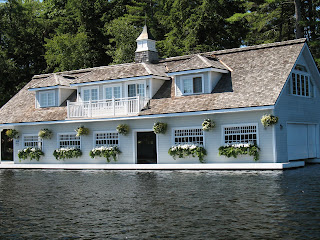
On my recent research trip to the Muskoka lakes, I took a delightful cruise on a 1920s-style yacht around the area known as Millionaires’ Row. It was here, over a century ago, that wealthy Americans began building their summer homes or “cottages”. Many were from Pittsburgh; some were and still are among the richest families in America. They ventured north to the pristine wilderness of the Canadian Shield to escape the industrial pollution and stifling heat of summer, bringing along a bevy of servants (one family had 27!), and staying for two or three months. Many of these well-preserved cottages are still in the family, and several generations have grown up on the lakes and been enchanted by the mystique of this beautiful district.
The boathouses are as fanciful as the gingerbread cottages, and usually have party rooms or living quarters above, often for the children or guests. (One is pictured above.) Many of these still shelter aquatic jewels - exquisite boats handcrafted by one of the world-renowned Muskoka boat builders. With vintage launches and grand cottages little changed, it’s easy to imagine the genteel life on these lakes a century ago.
To book a tour on the Idyllwood yacht, visit Sunset Cruises.
My Muskoka Novels will also transport you to this elegant era.














